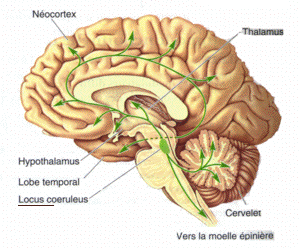|
LC-NA System
The locus coeruleus () (LC), also spelled locus caeruleus or locus ceruleus, is a nucleus in the pons of the brainstem involved with physiological responses to stress and panic. It is a part of the reticular activating system. The locus coeruleus, which in Latin means "blue spot", is the principal site for brain synthesis of norepinephrine (noradrenaline). The locus coeruleus and the areas of the body affected by the norepinephrine it produces are described collectively as the locus coeruleus-noradrenergic system or LC-NA system. Norepinephrine may also be released directly into the blood from the adrenal medulla. Anatomy The locus coeruleus (LC) is located in the posterior area of the rostral pons in the lateral floor of the fourth ventricle. It is composed of mostly medium-size neurons. Melanin granules inside the neurons of the LC contribute to its blue colour. Thus, it is also known as the nucleus pigmentosus pontis, meaning "heavily pigmented nucleus of the pons." Th ... [...More Info...] [...Related Items...] OR: [Wikipedia] [Google] [Baidu] |
Colliculus Facialis
The facial colliculus is an elevated area located in the pontine tegmentum (dorsal pons), within the floor of the fourth ventricle (i.e. the rhomboid fossa). It is formed by fibres from the facial motor nucleus looping over the abducens nucleus. The facial colliculus is an essential landmark of the rhomboid fossa. Anatomy The facial colliculus occurs within the rhomboid fossa (i.e. the floor of the fourth ventricle) where it is placed lateral to its (midline) median sulcus. Structure The facial colliculus is formed by brachial motor nerve fibres of the facial nerve (CN VII) looping over the (ipsilateral) abducens nucleus, forming a bump upon the surface. Clinical significance A facial colliculus lesion would result in ipsilateral facial paralysis (i.e. Bell's palsy Bell's palsy is a type of facial paralysis that results in a temporary inability to control the facial muscles on the affected side of the face. In most cases, the weakness is temporary and significantly i ... [...More Info...] [...Related Items...] OR: [Wikipedia] [Google] [Baidu] |
